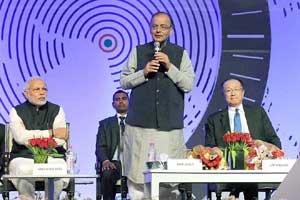Ahead of the Union Budget 2015-16, finance minister Arun Jaitley on Monday said the government would step up public investment in infrastructure sectors of road and highways and would stick to a non-adversarial tax regime as it tries to attract investors who were “scared” away by provisions of retrospective taxation.
“The large number of policy decisions will take some time before they actively start showing results on the ground. Public investment in infrastructure has to be expedited in sectors such as power and highways,” he said at the Invest in India Summit that was held as part of the Vibrant Gujarat Global Summit.
His comments are significant given that the finance ministry’s Mid-Year Economic Analysis had also suggested stepping up public investment to revive economic growth.
While Jaitley declined to respond to a query on whether he would switch to a fiscally expansionary policy in 2015-16, he said, “The mood is very positive amongst investors. I see investment moving up. But the government will step up public spending and incentivising expenditure in infrastructure and manufacturing will be the key focus areas of the government.”
He noted that the government is taking steps to clear the mess in coal and power sector, and added that last month, an “extraordinary step” was taken to fund the highways sector by hiking the excise duty on petrol and diesel by Rs 2 per litre.
“The benefit arising from lower oil prices allowed the government to take this extraordinary step … the government revenue will immediately be diverted to the National Highways Authority of India,” he said.
Meanwhile, underlining the need to attract more private investments, Jaitley said that the government is trying to consolidate investor sentiments after taking a slew of measure over the last seven months. “We do not want to send contrarian signals. India must stand in the front row to attract investments,” he said.
“To attract investors, we must have stability in policy, the direction must be clear and the pace of moving in the direction must be reasonably quick,” he stressed.
In this respect, he noted that the retrospective tax provision introduced by the previous minister had “scared away investors” from India.
“The government has no intention of using the retrospective tax provision,” he stressed, adding that it is instead looking to create mechanisms in the revenue department such as advance ruling agreements for domestic investors to improve the ease of doing business.
“In an aggressive tax regime, investors face a lot of trouble. Not one of the cases (under dispute) has brought any revenue to the government,” he noted.
